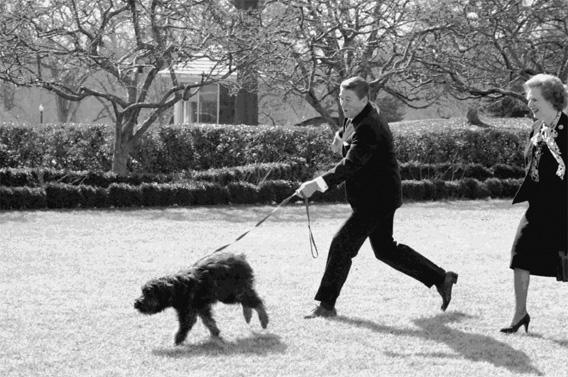Sometimes, it seems, we are just a step behind our British cousins. Jason Bourne is several decades younger than James Bond; the best of American rock ‘n’ roll lagged behind the Beatles and the Stones; even Downton Abbey doesn’t arrive until U.K. viewers have seen it. The same can hold true in politics. When Margaret Thatcher defeated a stale Labour regime in 1979 and assumed the office of prime minister, her victory registered beyond Britain’s shores. In the United States, a newly invigorated Republican Party noticed Thatcher’s rhetoric, full of opposition to Communism abroad and the welfare state at home. It was no surprise, then, that Ronald Reagan, upon assuming office in 1981, was anxious to extend a hand to the Iron Lady. As Richard Aldous notes in his thorough and engaging new history, Reagan and Thatcher: The Difficult Relationship, Ronnie and Maggie may have had something special going on, but like any love affair, this one had its issues.
by Richard Aldous
W.W. Norton & Company
In the years preceding this partnership, however, relationships between presidents and prime ministers tended to be distinctly unspecial. Lyndon Johnson was so irked by Harold Wilson’s attempts to use him for electoral purposes that he referred to the Labour premier as “that little creep camping on my doorstep.” A decade earlier, during the Suez Crisis, Dwight Eisenhower asked Anthony Eden, the Conservative prime minister, whether Eden had gone out of his mind. (The question was not rhetorical). Richard Nixon and Edward Heath were not very chummy, and although John F. Kennedy and Harold Macmillan had patrician backgrounds in common, the Jane Austen-loving premier was nonplussed at a meeting in 1961 to hear Kennedy pronounce, “If I don’t have a woman for three days, I get terrible headaches.”
Still, the narrative of the “special relationship” tends to be defined by the public’s perception of the Roosevelt-Churchill union. Though the correspondence between the two men make clear the wounded pride (on Churchill’s part) and the frustrations with his opposite number’s personality (on Roosevelt’s)—not to mention the general lack of camaraderie and fellow feeling—the relationship is still frequently presented in the popular press as overwhelmingly warm. (The portentous title of Jon Meacham’s tome on the subject, Franklin and Winston, is standard fare for the genre.) And the Reagan-Thatcher partnership is generally discussed in similar tones.
Aldous is a strong believer in the special relationship, but his book is nevertheless intended to pop the Reagan-Thatcher bubble: The honeymoon ended quickly, and the marriage wasn’t as fun as all that. As Aldous states at the outset, “Thatcher time and again …would find herself in conflict with a president who, despite her protestations to the contrary, she often viewed as much as a hindrance as a help to British foreign policy.” Aldous often takes the tone of a teenager shocked to discover that mom and dad used to get drunk in college. Apparently, gasp, Britain and America sometimes have divergent interests and different methods for achieving those interests.
As it has been since Churchill’s day, the problem was a fundamental imbalance in power. Reagan may have been happy to have support, but the British did not have any veto power. It is amusing to note the number of examples—from skirmishes over missiles in Europe to a dispute over Poland—wherein American officials adopted the precise posture taken by Billy Bob Thornton in Love Actually, where he plays an obnoxious American president—a Bush/Clinton hybrid—who meets his match in Hugh Grant’s oh-so-charming prime minister. When the Reagan administration decided that military force was necessary in Grenada, for example, the White House did not even bother to inform the British of their preliminary planning. A member of Thatcher’s Cabinet went before Parliament and said he had no reason to think an invasion was imminent. Reagan finally asked Thatcher’s opinion of the crisis, leading the British government to believe it had some say in the matter. Several hours later, without waiting for Thatcher’s response, Reagan sent her a short note saying that military action had been approved.
These disagreements echoed the blowup over the Falklands a year earlier.* When the murderous Argentine junta invaded what Argentina calls the Malvinas Islands in 1982, Thatcher responded with force. The resulting war led to almost 1,000 deaths, a British victory, a boost in popularity for the prime minster, and the downfall of the Argentinean dictatorship. It also caused a huge strain with Washington. Aldous is at his best here, going step-by-step through the crisis, and making clear the annoyance felt in White House over British “interference” in the hemisphere. (He might have made more of the Reagan administration’s disgraceful alliance with what was arguably that same hemisphere’s worst government, but one which nonetheless was helpful in aiding the Reaganites’ beloved contras.)
One of the frustrations that Thatcher may have felt—during this interlude and others—was Reagan’s cluelessness about the actions of his own government. Although Aldous is generally complimentary of the president’s political intelligence, he leaves us in little doubt that during the Falklands war, Reagan “had only the haziest notion of what was going on.” (Reagan fans should remind themselves that this occurred in his first term.) Other tiffs, mostly focusing on the Soviet Union, generally fit a pattern, with Thatcher making her displeasure felt before eventually coming around to the American position.

Photograph by Peter Mauney.
“Irony was never part of Margaret Thatcher’s makeup, and she was certainly not prepared to entrust British defense policy to it,” Aldous writes. But the Reagan-Thatcher relationship did have its ironic component, specifically in their personal interactions: Thatcher was undoubtedly the alpha dog, frequently badgering Reagan and making her opinions known. Aldous provides the wonderful transcript of a phone call during the Falklands crisis. It is worth quoting at length:
“This is democracy and our island,” she warned him, “and the very worst thing for democracy would be if we failed now.”
“Yes …” began Reagan.
Thatcher cut across him again.
“Ron, I’m not handing over … I’m not handing over the island now. I can’t lose the lives and blood of our soldiers …”
“Margaret, but I thought that part of the proposal …”
“You surely are not asking me, Ron, after we’ve lost some of our finest young men, you are surely not saying, that after the Argentine withdrawal, that our forces, and our administration, become immediately idle? …”
“Margaret, I …”
“I wonder if anyone over there realizes, I’d like to ask them. Just supposing Alaska was invaded? …”
“No, no, although Margaret, I have to say I don’t quite think Alaska is a similar situation.”
“More or less so,” she snapped back.
“Yeah, well, uh … uh …Well Margaret, I know I’m intruding on you …”
Nor was this a one-off occurrence. When Reagan called to apologize to Thatcher over American unilateralism vis-à-vis Grenada, he sounded less like a president and more like a suitor trying too hard to please:
“I must return to this debate in the house,” she told the President. “It is a bit tricky.”
“All right,” Reagan replied, with a joviality that seemed inappropriate to the situation. “Go get ‘em! Eat ‘em alive!”
“Goodbye,” said Thatcher. And she was gone.
The pop-psychological explanation, and one hinted at by Aldous, is that Thatcher resented being the junior partner; but it is probably just as true to say that she was simply made of firmer stuff. Unfortunately for British patriots, these Love Actually moments occurred only in private.
Aldous, high-mindedly, doesn’t really keep score, or tell us who was “right” more often, so I will. Reagan’s defense of the Argentinean generals now seems even worse than it did at the time, but Thatcher’s initial warmth toward Gorbachev cooled significantly, and it was Reagan who adopted the Soviet leader as an ally, to excellent returns. Yet there isn’t really enough to tally: The disagreements were minimal, considering they stretched over eight years, and the special relationship was further strengthened—at least in the imagination of most voters.
But perhaps that is too cynical. Of all the lies citizens tell themselves, or all told by their leaders, the rhetorical stress on a bond between two countries is relatively innocuous. And while it’s easy enough to romanticize British-American fellow-feeling, it’s also proved valuable time and again, and may well once more. Polling, unsurprisingly, shows high regard for the United Kingdom in this country; the Brits, meanwhile, register warmer feelings toward us than do other European allies. Rhetoric begins to equal reality. If both sides want and need to believe a special relationship exists, then, well, it does. Love may be an illusion, but it beats the alternative.
See all the pieces in the new Slate Book Review.
Correction, April 2, 2012: This article inaccurately stated the order of the conflicts in the Falklands and Grenada. The Falklands War occurred in 1982; the Grenada conflict in 1983. (Return to the corrected sentence.)
